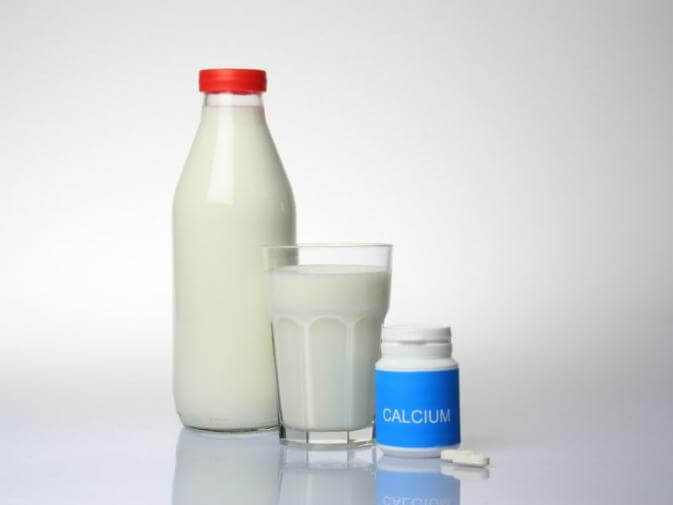
A new study published earlier this month found that taking a calcium supplement could increase your risk of developing polyps in your colon—especially if you have had polyps in the past. Calcium supplements are among the most commonly recommended—and taken—nutritional supplements.
Although adequate calcium intake throughout life (and especially during childhood and adolescence) can reduce the risk of osteoporosis later in life, the benefits of calcium supplementation in midlife and beyond appear to be modest, at best. And a growing body of evidence suggests that calcium supplements may increase the risk of other problems, such as kidney stones, heart disease, and now colon polyps.
In this latest study, researchers recruited 2,000 people who had previously been diagnosed with polyps and divided them into four groups. One group took a supplement providing 1,200 mg of calcium per day—a pretty standard dosage. A second group took 1,000 IU of vitamin D. A third group took both calcium and vitamin D. A fourth group took a placebo.
The researchers probably hoped that those taking the calcium would have a lower incidence of polyps. This would have been in line with the results of a meta-analysis published in 2016, which found that taking 1,200 to 2,000 mg of calcium per day led to a modest decrease in the incidence of colon polyps. However, this was not what they saw. Wait for it...
The Link Between Calcium and Colon Polyps
Five years into the study, no significant difference was seen between the groups. But fortunately, the study did not end there. Ten years into the study, the groups taking calcium were three times more likely to develop additional colon polyps than the group taking the placebo. There was no link between calcium intake from foods and an increased risk of colon polyps.
It’s important to point out that polyps are not cancerous—but they can eventually turn into cancer if they are not removed. This is why those screening colonoscopies are so important. Catching and removing these relatively benign polyps before they can become malignant can save your life. And because the patients in this study were being closely followed, none of them developed colon cancer.
But even if it doesn’t lead to cancer, taking a supplement that increases the occurrence of colon polyps may lead to unnecessary medical costs and risks due to more frequent screening and removal of the polyps. I speak from personal experience here.
Here's Where It Gets Personal
When I went for my first screening colonoscopy a couple of years ago, the doctor found a large polyp which required two additional procedures to completely remove. Instead of returning after five or ten years for my next screening, I now have to have annual rechecks. Although my initial procedure was at an outpatient endoscopy center, I now have to do these in a hospital, which costs both me and my insurance company about five times as much as the endoscopy center. And, of course, every time they put me under, there’s a risk that something could go wrong. While the likelihood of injury or infection is pretty low, having to have this procedure every year instead of every decade obviously increases my risk substantially.
Of course, I’m super grateful that this was caught early and I take every opportunity to encourage people not to put off their screenings. I’ll take the inconvenience and expense of frequent colonoscopies over chemotherapy and surgery any day. But if taking calcium supplements increases the number of people who require this more intensive follow up, that’s a pretty big price to pay. Especially if it’s not actually doing that much to prevent fractures or osteoporosis.
Let's Get Our Calcium from Foods, Not Pills
None of the harmful effects observed with calcium supplements have been seen in people who get their calcium from foods. And even if your diet falls short of the recommended intake, you can probably fill the gap with a much smaller dose than people usually take.
Doubling up on your calcium will not make your bones twice as strong. But it may increase your risk of other health problems.
The total recommended intake for calcium is 1,000 to 1,300 mg, depending on your age. Most calcium supplements (and most of the research on calcium supplementation) are designed to provide 1,000 to 2,000 mg of supplemental calcium per day. But this is almost always overkill.
According to the National Health and Nutrition Examination Survey (NHANES), the average American takes in over 1,000 mg calcium per day from foods alone. Even those who are falling below the recommended intake could meet the recommended intake by taking just 250 mg supplemental calcium. So why are we all taking so much? Doubling up on your calcium will not make your bones twice as strong. But it may increase your risk of other health problems.
It Takes More Than Calcium
Finally, remember that calcium is only one of many nutrients needed for strong bones. Vitamin D helps your body absorb and use calcium but strong bones also require a host of other vitamins, minerals, essential fatty acids, and even protein. Leafy greens and other fruits and vegetables, legumes, nuts, seeds, whole grains, fish, and lean meats all contribute important bone-building nutrients. For more, see my previous episode on Diet for Healthy Bones.
And don’t forget about “vitamin X,” or Exercise, which not only increases the health of your bones but helps improve muscle strength and balance and preserves your overall vitality as you age. For more tips on how to get fit and strong at any age, be sure to check out the Get Fit Guy Podcast.
Image of calcium sources © Shutterstock
Oxitan 50mg Injections is utilized in the therapy of cancer of the colon and rectum. It shows its working by halting or hindering the development of cancer cells.Oxitan Injection utilizes in Cancer of the colon and rectum.
BalasHapus